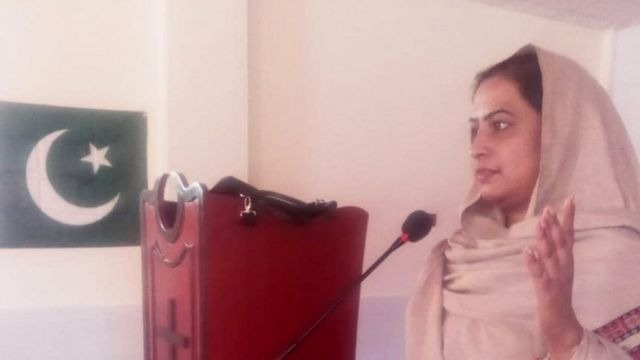
Muhammad Faheem
Local body elections in Khyber Pakhtunkhwa were conducted in two phases after a two-year delay. In the first phase, three tribal districts were included for the first time, marking a significant development for the region. In this context, a female candidate from Bajaur stepped forward.
The female candidate, Sana Pervez, hailing from the Christian community, represented a breakthrough for minority women in a tribal area. Sana submitted her papers on a Jamaat-e-Islami ticket from village council number three Mir Ali Qila of Tehsil Khar in Bajaur and secured an uncontested victory. Despite her initial prominence with interviews in various journals, after two years, Sana is disenchanted with the local government system.
Sana Pervez recounts that she got married in Kohat. When the local body elections approached, her father advised her to return to Bajaur, contest the elections, and serve the local populace. Acting on this advice, Sana, accompanied by her husband, returned to Bajaur.
Also Read: Alarming Rise in HIV-AIDS Cases in Khyber Pakhtunkhwa
In the tribal area, where women are typically marginalized, Sana highlights that she has not been called to attend any council meeting in the past two years. While she was invited to Jirga Hall for the oath-taking ceremony, she has not been integrated into any democratic system since then. Sana was even denied the opportunity to speak during the meeting where she took the oath.
Parvez continues her efforts to address the issue of graveyards for minorities. She emphasizes the urgent need for a cemetery, asserting that finding suitable land would resolve the predicament faced by thousands of Christian citizens. Currently, due to the absence of facilities to bury minorities in Bajaur, ambulances are compelled to transport deceased individuals to Peshawar, Nowshera, or other districts for burial.
Advocating for the establishment of a special vocational center for Christian women in Bajaur, Sana emphasizes the essential nature of women's training. With the appropriate authority, she asserts that she could resolve issues related to domicile and identity cards for women and men in the region. Expressing frustration about the lack of funds, Sana states that she has not received a single rupee in two years.
The first phase of local body elections in Khyber Pakhtunkhwa took place on December 19, 2021. As this month marks two years since these elections were held, local government representatives from across the province have announced a protest in Peshawar on December 19, which will be observed as Black Day.
The chosen location for the protest is in front of the Chief Minister's House. However, local government representatives have requested the provincial government to prevent the protest by ensuring the timely provision of powers and funds.
A collective decision has been made by local body representatives across the province to seek permission from the Chairman Election Commission to issue an ordinance for the transfer of powers. Following a meeting with the caretaker Chief Minister, they plan to request the issuance of rules of business and funds.
Additionally, local government representatives will meet with the provincial leaders of all political parties to seek their support in strengthening the local government system. A charter of demands will be presented during protests across cities, tehsils, villages, and neighborhood councils in the province.
As per the local government system of Khyber Pakhtunkhwa, each council comprises three general councilors, with the chairman elected based on the highest number of votes. Seats are reserved for a minority member, a woman councilor, a youth councilor, and a 'Mazdoor Kisan' (laborer/farmer). However, in rural areas, most women's seats remained uncontested in the elections, and minority seats have also remained vacant.
Muslim Taj, a woman councilor of PTI in Peshawar, expresses her disappointment at not receiving funds or authority in two years. Despite a caretaker government having funds for other development projects, local government representatives, including Muslim Taj, are not receiving funds. To address the problems faced by women and other marginalized sections, devolving power to the grassroots level is deemed essential.
Financial allocations for local governments in Khyber Pakhtunkhwa for the financial year 2021-22 amounted to 17 billion 40 crore rupees. For the financial year 2022-23, 41 billion rupees were allocated to local governments. Moreover, over 20 billion 66 crores have been earmarked for local governments in the first 8 months of the current financial year. Despite these allocations, not a single penny has been released.
The caretaker government clarifies that a ban on the release of development funds by the Election Commission is currently in place. As long as this ban persists, the funds cannot be released. From the municipal elections of December 19, 2021, a substantial amount of 79 billion 6 Crores rupees have been allocated for local governments, but no payments have been made.